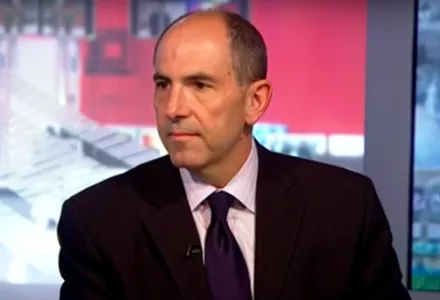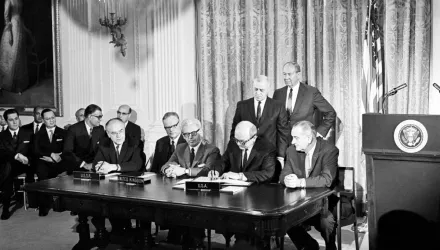Israelis, Palestinians, and the larger Middle East are nearing multiple crossroads. Israelis will make a choice about their country’s future on April 9 in national elections that will end or extend Prime Minister Benjamin Netanyahu’s decade-long rule. Meanwhile, the Palestinians will soon make a generational change within a somewhat aimless national movement led by 83-year old Mahmoud Abbas. As living conditions continue to deteriorate in Gaza, which is cut off geographically and politically from the West Bank, war between Israel and Hamas could escalate into the fourth war between them in the past decade.
This enduring conflict between two rival nationalist movements—each claiming patrimony over the land between the Jordan River and the Mediterranean—takes place within a wider turbulent Middle East. Proxy wars and armed conflicts are taking place in Yemen, Syria, Iraq, Libya, Lebanon, and Iraq. These conflicts have engendered an informal and largely tacit coalition of Sunni Arab states, led by Saudi Arabia and Israel on the one side. On the other side of this regional divide are Iran and its sub-state regional partners.
Against this backdrop, the United States is actively preparing to intensify its efforts along two separate paths in the Middle East: One path is focused on coalescing efforts to contain and combat Iran’s regional ambitions in the wake of President Trump’s withdrawal from President Obama’s nuclear agreement with Iran. The other path has the Trump Administration preparing to release a comprehensive peace plan to end the Israeli-Palestinian conflict. There have been no negotiations between Israel and the PLO since May 2014, and both sides remain deeply entrenched in a volatile yet seemingly immutable status quo.
Session 1 will focus on "Israelis, Palestinians, and the larger Middle East: Context and Crossroads" and Session 2 will focus on "Fateful Choices: Middle East Confrontations, the Trump Administration, and the Prospects for War and Peace in the Middle East."
Both seminars will look at Israeli and Palestinian conflicting perspectives today with respect to this wide array of issues and dynamics. They will examine the Israeli and Palestinian respective realities: first domestically, then bilaterally, and finally in the broader regional context. They will address the following questions:
- What does the domestic political and diplomatic picture look like for Israel today? How is Israel changing? What is at stake in Israel’s upcoming elections?
- What is the status of the Palestinian national movement today? What is the reality for Palestinians living in Israel, Jerusalem, Gaza, the West Bank, and the diaspora?
- What is the future of the Zionist national movement and the Palestinian national movement?
- What is the impact on the region and on Israelis and Palestinian of the nuclear agreement (JPCOA) reached between Iran and the Obama Administration? And is President Trump’s withdrawal from the agreement and subsequent pressure campaign on Iran connected to the Israeli-Palestinian conflict?
- What are the prospects for the Trump Administration’s proposed peace plan for Israelis and Palestinians? How have the Trump Administration’s policy shifts towards Jerusalem, UNRWA, the PLO, foreign assistance, and Gaza affected the Administration’s efforts to reach a comprehensive peace agreement? What is new about the Administration’s regional approach? And what is unlikely to be different?
- How has the Middle East changed as a result of the largely failed Arab uprisings since 2011? How has the rise of Saudi Arabia’s Mohammad Bin Salman affected regional equations?
- What are the prospects for peace between Israel and the Palestinians and/or peace between Israel and the Arab states, other than Jordan and Egypt that have yet to do so?
---
Dr. Robert Danin Robert M. Danin is a non-resident senior fellow with the Future of Diplomacy Project and a senior fellow for Middle East studies at the Council on Foreign Relations. Prior to joining CFR, he headed the Jerusalem mission of Quartet representative Tony Blair from 2008 through 2010 and was actively involved in Israeli-Palestinian peace negotiations through 2013. He has served as a frequent commentator and analyst of Middle East developments, and has also served as a “thought leader” for the World Economic Forum Bridging the Gap project bringing together top Palestinian and Israeli business leaders.
A former career State Department official with over twenty years of Middle East experience, Dr. Danin previously served as Deputy Assistant Secretary of State for Near Eastern Affairs with responsibilities for Israeli-Palestinian issues and Syria, Lebanon, Jordan, and Egypt. In that capacity, he helped lead the diplomatic efforts leading to the 2007 Annapolis Conference that brought together the leaders from the United States, Israel, and the Palestine Authority as well as officials from forty-nine other countries to launch peace negotiations. He also served at the National Security Council for over three years, as Director for Israeli-Palestinian affairs and the Levant and then as acting Senior Director for Near East and North African affairs. Dr. Danin served as a Middle East and Gulf specialist on the Secretary of State's Policy Planning Staff, and as a Middle East political and military analyst in the State Department’s Bureau of Intelligence and Research.
Prior to joining the State Department, he worked as a Jerusalem-based journalist covering Israeli and Palestinian politics. Dr. Danin holds a BA in history from the University of California, Berkeley, an MSFS degree from Georgetown University's School of Foreign Service, and a doctorate in the international relations of the Middle East from St. Antony's College, Oxford University.



